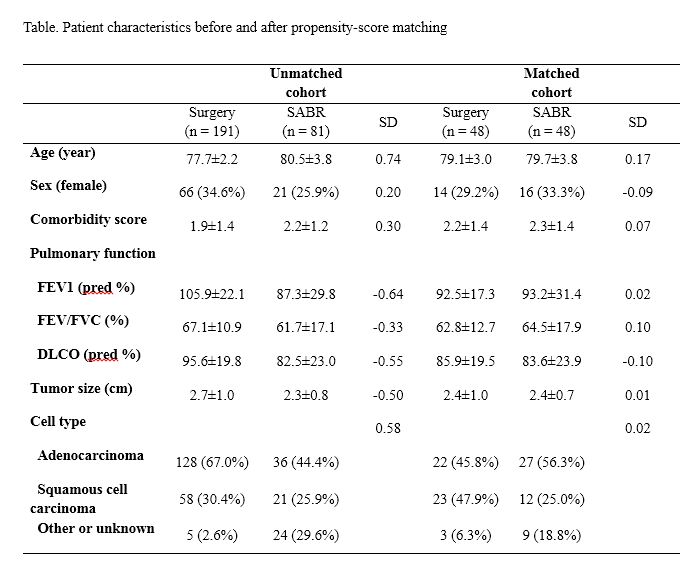초록접수 현황
| 19F-237 | 구연 미채택시 포럼 발표 |
Comparison of Stereotactic Ablative Radiotherapy to Surgical Treatment in Elderly Patients with Stage I Lung Cancer
Samina Park, So Young Bae, Jae won Song, Kwon Joong Na, Hyun Joo Lee, In Kyu Park, Young Tae Kim, Chang Hyun Kang
Department of Thoracic and Cardiovascular Surgery, Seoul National University Hospital, Seoul National University College of Medicine, Seoul, Republic of Korea
Purpose : Surgical resection is the best option for early stage lung cancer. However, elderly patient are less likely to receive curative resection due to co-morbidities, high operative mortality and frailty. Therefore, we compared long-term survival rates between surgical resection and stereotactic ablative radiotherapy (SABR) in elderly patients.
Methods : From 2013 to 2016, 272 patients aged ≥ 75 with clinical stage I lung cancer were treated with surgical resection (n=191) or SABR (n=81). A propensity score-matched analysis was performed to minimize differences in tumor and patients characteristics. Overall and recurrence-free survivals were evaluated between two groups. Median follow-up duration was 42 months.
Results : Patients who underwent SABR were older and had worse pulmonary functions, higher comorbidity score, and smaller tumors than those of surgery group (table). There were significant differences in 5-year overall survival rates (surgery vs. SABR = 77.2% vs. 39.7%; p <0.001) and 3-year recurrence-free survival rates (surgery vs. SABR = 82.1% vs. 70.3%; p=0.013). Four mortalities in surgery group but no mortality in SABR group were observed in six months after the first treatment. Systemic dissemination was a dominant pattern of progression in both groups. In the matched cohort, overall survival benefit in surgery group was shown persistently (p=0.034); however, there was no significant difference in recurrence-free survival between two groups (p=0.439).
Conclusion : Surgical resection provided better long-term survival compared to those of SABR in elderly patients with early stage lung cancer. However, SABR could have a role to yield comparable recurrence-free survival for patients who are intolerant to surgical treatment.
Methods : From 2013 to 2016, 272 patients aged ≥ 75 with clinical stage I lung cancer were treated with surgical resection (n=191) or SABR (n=81). A propensity score-matched analysis was performed to minimize differences in tumor and patients characteristics. Overall and recurrence-free survivals were evaluated between two groups. Median follow-up duration was 42 months.
Results : Patients who underwent SABR were older and had worse pulmonary functions, higher comorbidity score, and smaller tumors than those of surgery group (table). There were significant differences in 5-year overall survival rates (surgery vs. SABR = 77.2% vs. 39.7%; p <0.001) and 3-year recurrence-free survival rates (surgery vs. SABR = 82.1% vs. 70.3%; p=0.013). Four mortalities in surgery group but no mortality in SABR group were observed in six months after the first treatment. Systemic dissemination was a dominant pattern of progression in both groups. In the matched cohort, overall survival benefit in surgery group was shown persistently (p=0.034); however, there was no significant difference in recurrence-free survival between two groups (p=0.439).
Conclusion : Surgical resection provided better long-term survival compared to those of SABR in elderly patients with early stage lung cancer. However, SABR could have a role to yield comparable recurrence-free survival for patients who are intolerant to surgical treatment.

책임저자: Chang Hyun Kang
Department of Thoracic and Cardiovascular Surgery, Seoul National University Hospital, Seoul National University College of Medicine, Seoul, Republic of Korea
발표자: Samina Park, E-mail : saminapark1203@gmail.com








